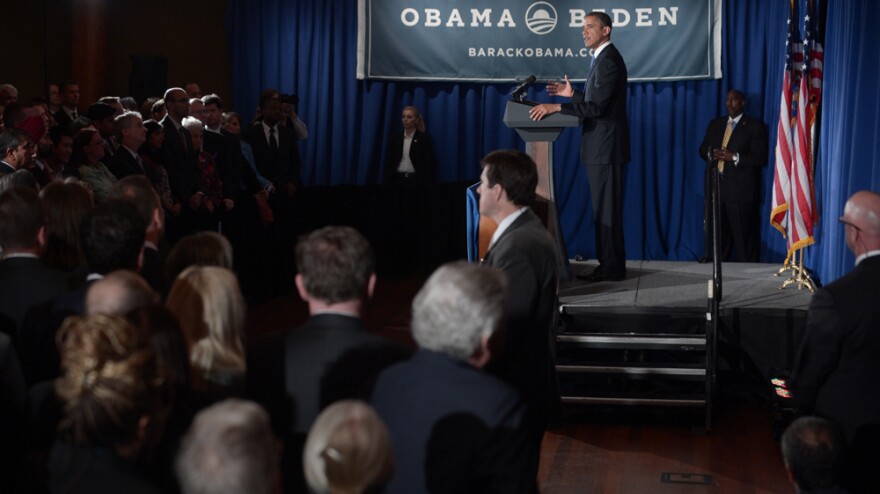President Obama is attending a campaign fundraiser Monday night co-hosted by gay- and lesbian-rights leaders and a Latino nonprofit. The event is being headlined by singer Ricky Martin.
Obama maintains a commanding lead over likely GOP presidential nominee Mitt Romney when it comes to support among Latino voters. But those same voters are generally regarded as socially conservative, leading some to wonder how the president's support for same-sex marriage might affect the Latino electorate.
Roberto Ordenana, a 35-year-old native San Franciscan and LGBT activist, was on his way to work when he first got the news of the president's announcement. Days later, the memory of that moment makes Ordenana smile like he's won the lottery.
"When I heard about it, I was completely elated," he says. "I was taken by surprise, and immediately I just felt an incredible sense of pride."
Ordenana says he immediately called his parents, whom he describes as being like the president — in other words, their thinking has "evolved" from the days when he first came out at the age of 19.
"They have openly met my friends and accepted them into our family," Ordenana says. "At the same time, they go to church every Sunday morning. And so they're able to hold both their religious beliefs and also the knowledge that LGBT individuals should be treated equally."
No one would suggest that the acceptance Ordenana found with his family is universal in other Latino families or the community at large. But his story might challenge a commonly held assumption that goes like this: Latinos have socially conservative views on religion and family; therefore, Obama's statement won't play well with Latino voters.
"I will be very surprised if this lessens his support among Latino voters at all," says Luis Fraga, who teaches political science at the University of Washington.
Not High On The List
Fraga says there's no evidence that Latino voters favor traditional moral or social values over bread-and-butter issues.
"A very important issue for Latino voters is immigration," Fraga says. "The president has come out very strongly in favor of comprehensive immigration reform and the DREAM Act. That is a far more important issue to Latino voters, as are jobs and the economy, than are issues associated with same-sex marriage."
Still, opponents of gay marriage within the Latino community made it clear they weren't happy with the president's statement.
The Rev. Sam Rodriguez of the California-based National Hispanic Christian Leadership Conference told Fox °µºÚ±¬ÁÏ Latino: "This is about the government saying, 'We are going to hijack a religious doctrine and change it for you.' "
From New York, the Rev. Gabriel Salguero of the National Latino Evangelical Coalition echoed that protest. "There is real concern about the church's freedom to define marriage within its own religious liberty issue ... and we're looking really closely [at] what the president's statements mean in terms of policy."
'Part Of Our Families'
Still, Salguero isn't prepared to call the president's statement a deal breaker for Hispanic evangelical voters.
Polls suggest that Latino views on same-sex marriage are aligned with American public opinion in general — a slight but growing majority supports marriage equality, and strong outright opposition is minimal.
"You know, there's a lot of gay people in the Latino community, LGBT people in the Latino community, and they are part of our families," says Antonio Gonzalez, president of the William C. Velasquez Institute, a public policy and research group based in Texas. "I think we're going through a self-education and sensitizing process just like everybody else."
And he says even if the president loses some Latino votes on this issue, he is likely to make up for it with a re-energized gay and lesbian base.
Copyright 2020 NPR. To see more, visit https://www.npr.org. 9(MDAxNDQ2NDAxMDEyNzU2NzM2ODA3ZGI1ZA001))







